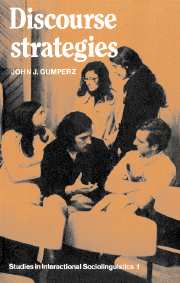Book contents
- Frontmatter
- Contents
- Preface
- A note on conventions
- 1 Introduction
- 2 The sociolinguistics of interpersonal communication
- 3 Social network and language shift
- 4 Conversational code switching
- 5 Prosody in conversation
- 6 Contextualization conventions
- 7 Socio-cultural knowledge in conversational inference
- 8 Interethnic communication
- 9 Ethnic style in political rhetoric
- 10 Postscript
- Bibliography
- Author index
- Subject index
7 - Socio-cultural knowledge in conversational inference
Published online by Cambridge University Press: 09 November 2009
- Frontmatter
- Contents
- Preface
- A note on conventions
- 1 Introduction
- 2 The sociolinguistics of interpersonal communication
- 3 Social network and language shift
- 4 Conversational code switching
- 5 Prosody in conversation
- 6 Contextualization conventions
- 7 Socio-cultural knowledge in conversational inference
- 8 Interethnic communication
- 9 Ethnic style in political rhetoric
- 10 Postscript
- Bibliography
- Author index
- Subject index
Summary
Conversational inference, as I use the term, is the situated or context-bound process of interpretation, by means of which participants in an exchange assess others' intentions, and on which they base their responses.
Recent studies of conversation from a variety of linguistic, psychological, anthropological and sociological perspectives, have shed light upon a number of issues important to the study of conversational inference. It is generally agreed that grammatical and lexical knowledge are only two of several factors in the interpretation process. Aside from physical setting, participants' personal background knowledge and their attitudes toward each other, sociocultural assumptions concerning role and status relationships as well as social values associated with various message components also play an important role. So far, however, treatment of such contextual factors has been primarily descriptive. The procedure has been to identify or list what can potentially affect interpretation. With rare exceptions, no systematic attempts are made to show how social knowledge is used in situated interpretation. Yet we know that social presuppositions and attitudes shift in the course of interaction, often without a corresponding change in extralinguistic context. As we have argued in previous chapters, the social input to conversation is itself communicated through a system of verbal and nonverbal signs that both channel the progress of an encounter and affect the interpretation of intent. It follows that analysis of such ongoing processes requires different and perhaps more indirect methods of study which examine not the lexical meanings of words or the semantic structure of sentences but interpretation as a function of the dynamic pattern of moves and countermoves as they follow one another in ongoing conversation.
- Type
- Chapter
- Information
- Discourse Strategies , pp. 153 - 171Publisher: Cambridge University PressPrint publication year: 1982
- 5
- Cited by



